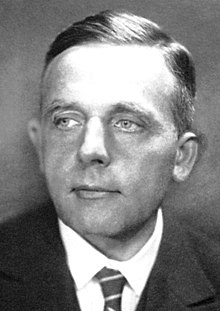Otto Heinrich Warburg
Otto Heinrich Warburg | |
|---|---|
 Otto Heinrich Warburg | |
| Born | 8 October 1883 |
| Died | 1 August 1970 (aged 86) |
| Alma mater | University of Berlin University of Heidelberg |
| Known for | Oncometabolism Warburg hypothesis Warburg effect (oncology) Warburg effect (plant physiology) Warburg–Christian method |
| Awards | Iron Cross 1st class (1918) Nobel Prize in Physiology or Medicine (1931)[1] Pour le Mérite (Civil Class) (1952) Paul Ehrlich and Ludwig Darmstaedter Prize (1962) Foreign Member of the Royal Society[2] |
| Scientific career | |
| Fields | Cell biology |
| Institutions | Kaiser Wilhelm Institute for Biology |
| Doctoral advisor | Emil Fischer Ludolf von Krehl |
Otto Heinrich Warburg (October 8, 1883 - August 1, 1970) was a German chemist.[3] After earning his doctorate degrees in medicine and chemistry, he started to investigate how oxygen is consumed by cells in a living organism. His studies led him to identify the role of the cytochromes.[4]
He won the 1931 Nobel Prize in Physiology or Medicine for the discovery of the respiratory enzyme.
Cancer
[change | change source]In the 1920s, Warburg and his colleagues observed that tumors take up higher amounts of glucose than their surrounding tissues. Although consuming glucose is helpful for mammals because it is a nutrient, tumor cells consume too much glucose despite having working mitochondria and enough presence of oxygen. This observation is called the Warburg effect.[5]
Following this observation, Warburg and his colleagues concluded: that to kill a tumor cell, it must be deprived of glucose.[5]
References
[change | change source]- ↑ "The Nobel Prize in Physiology or Medicine 1931". NobelPrize.org. Retrieved 18 February 2024.
- ↑ Krebs, H. A. (1972). "Otto Heinrich Warburg 1883-1970". Biographical Memoirs of Fellows of the Royal Society. 18: 628–699. doi:10.1098/rsbm.1972.0023. PMID 11615754.
- ↑ "Biography of Otto Warburg". The Nobel Foundation. Retrieved 2 July 2009.
- ↑ "Otto Warburg | Nobel Prize, Cell Respiration, Metabolism | Britannica". www.britannica.com. Retrieved 6 February 2024.
- ↑ 5.0 5.1 Liberti, Maria V.; Locasale, Jason W. (March 2016). "The Warburg Effect: How Does it Benefit Cancer Cells?". Trends in Biochemical Sciences. 41 (3): 211–218. doi:10.1016/j.tibs.2015.12.001. PMC 4783224. PMID 26778478.
